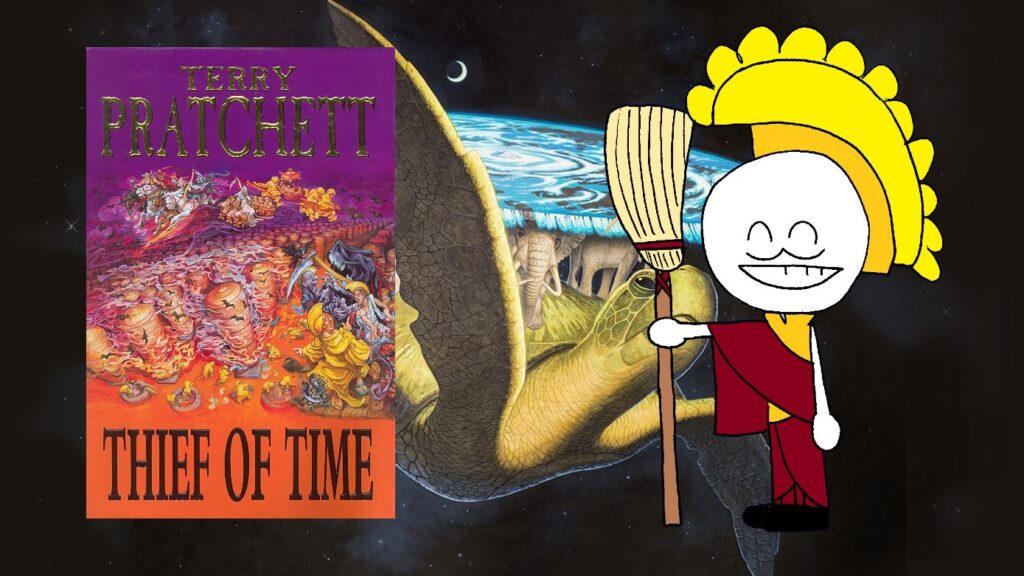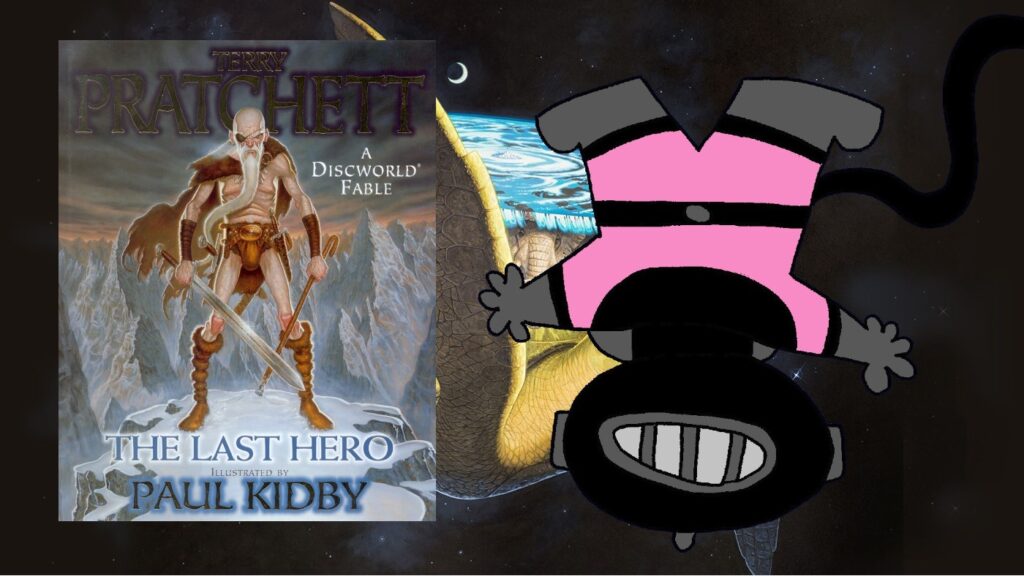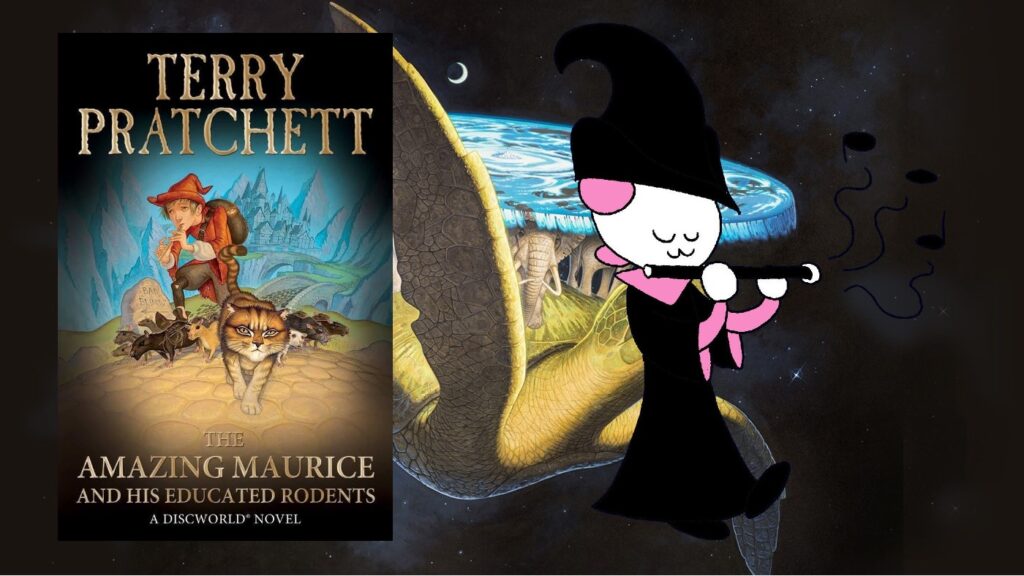Hey everyone. So, if you were there for my Youtube channel, you probably know that I divide the books in the Discworld series into distinct eras. Because I never finished my Fantastic Fiction series on Discworld though, I never got a chance to fully explain just where I draw the lines dividing these eras, and what distinguishes them all from each other. Now that I’ve got this blog though, I’d like to take the time to do just that.
The Genesis Era (The Colour of Magic to Moving Pictures)
I call this the Genesis Era simply because it is, well, the genesis of Discworld, and of Terry Pratchett as an author. It’s where Sir Terry cut his teeth as a writer and laid the groundwork for the world he would explore. For the most part, these books are harmless fluff and fun romps, and are a far cry from the richer, deeper works Pratchett would later put out. However, even if, as Neil Gaiman says, the first batch of Discworld books are largely just a collection of jokes (and not even very good jokes), there are definitely the seeds of something great that you can see in them. Indeed, two of the books from this era (Wyrd Sisters and Guards! Guards!) display an unusual amount of richness and social commentary (Guards! Guards! in particular), heralding future heights the series would attain. And even with this as the series’s low point, I don’t think I would call any of the books here bad per se, just occasionally dull. So, while some people might tell you to skip to later books if you want to enjoy Discworld, I’d encourage readers to at least try out the Genesis Era books first, only skipping to the later stuff if you’re just not feeling it.
The Golden Era (Reaper Man to Jingo)
I call this the Golden Era because it represented a fresh surge of creativity in the Discworld series, as Sir Terry, now a far better, more experienced writer, shifted focus away from simple parodies and towards deeper satire, which is what made the series such a mainstay in the fantasy community. It represents a high water mark for the series as a whole, and while some might argue over where that mark ends, for me the last Golden Era Discworld book is Jingo, because it’s the last book in this bunch to feel truly innovative. Every book in the Golden Era feels like Pterry is excitedly buzzing with new ideas and new interests he wants to explore, and having now settled on a stable cast of characters, Pratchett uses this time to explore and enrich them further. This is where my favorite Discworld books are, and where a lot of fans recommend you start, since it’s early enough in the series that everything is still new, but late enough that Sir Terry is firing on all creative cylinders.
The Silver Era (The Lost Continent to The Last Hero)
All good things must come to an end, and every car eventually runs out of juice. By the time the Discworld series numbered in the 20s, Pratchett had settled into a pattern. The books never became bad, since by that point even in his sleep Pterry could spin a good yarn. But there’s a distinct feeling of Sir Terry going through the motions by this point. The books in this era tend to either be proper, lasting sendoffs (The Lost Continent), experiments that don’t really work (Carpe Jugulum), more of the same (The Fifth Elephant), or onanistic canon-wielding (Thief of Time). Even the most interesting and creative of the books in this era, The Last Hero, feels like a tryout for new cover artist Phil Kidby. Again, it’s never bad per se, but at this point my (and I suspect Pterry’s) enthusiasm for Discworld was beginning to wane.
The Renaissance Era (The Amazing Maurice to Making Money)
When you’ve been doing something for long enough, you can forget the things you liked about it. Even your favorite dish starts to taste stale if you eat it every day, and it’s only when some new thing comes along to shake up your routine that you remember why you fell in love in the first place. With Pratchett, that thing was The Amazing Maurice, an assignment to write a typical Discworld book, but for a younger audience (with all the considerations that entails). This ended up being a shock to the system, which allowed Sir Terry to explore new stories, new characters, and new corners of the Disc, resulting in his absolute best work. Night Watch is regarded by many, myself included, as the best Discworld novel, and it’s from this era, alongside other amazing classics like The Wee Free Men and Going Postal (amongst the most well-known Discworld books). Unfortunately, this was not to last.
The Thanatos Era (Unseen Academicals to The Shepherd’s Crown)
In 2007, Terry Pratchett was diagnosed with Alzheimer’s Disease. This led to a reevaluation of his life and work, and a focus on public advocacy and charity work towards Alzheimer’s research. During this time, Pterry took a brief break from Discworld to publish his manifesto, Nation, and when at last he returned to the Disc, there was a noticeable change in mood. This last batch of books has a somberness and melancholy to it, no doubt informed by Prathett’s desire to make the most of whatever time he had left. And while he had given his characters sendoffs before, in this era it feels like Sir Terry is trying to give everyone a happy ending. Terry Pratchett succeeded in something that few authors accomplish, creating a fully realized fantasy world. And even as the characters he illustrated this world through reach the end of their stories in this era, the roots he put down are strong enough that you know the world will survive long after the characters, and Terry, are gone. GNU.



